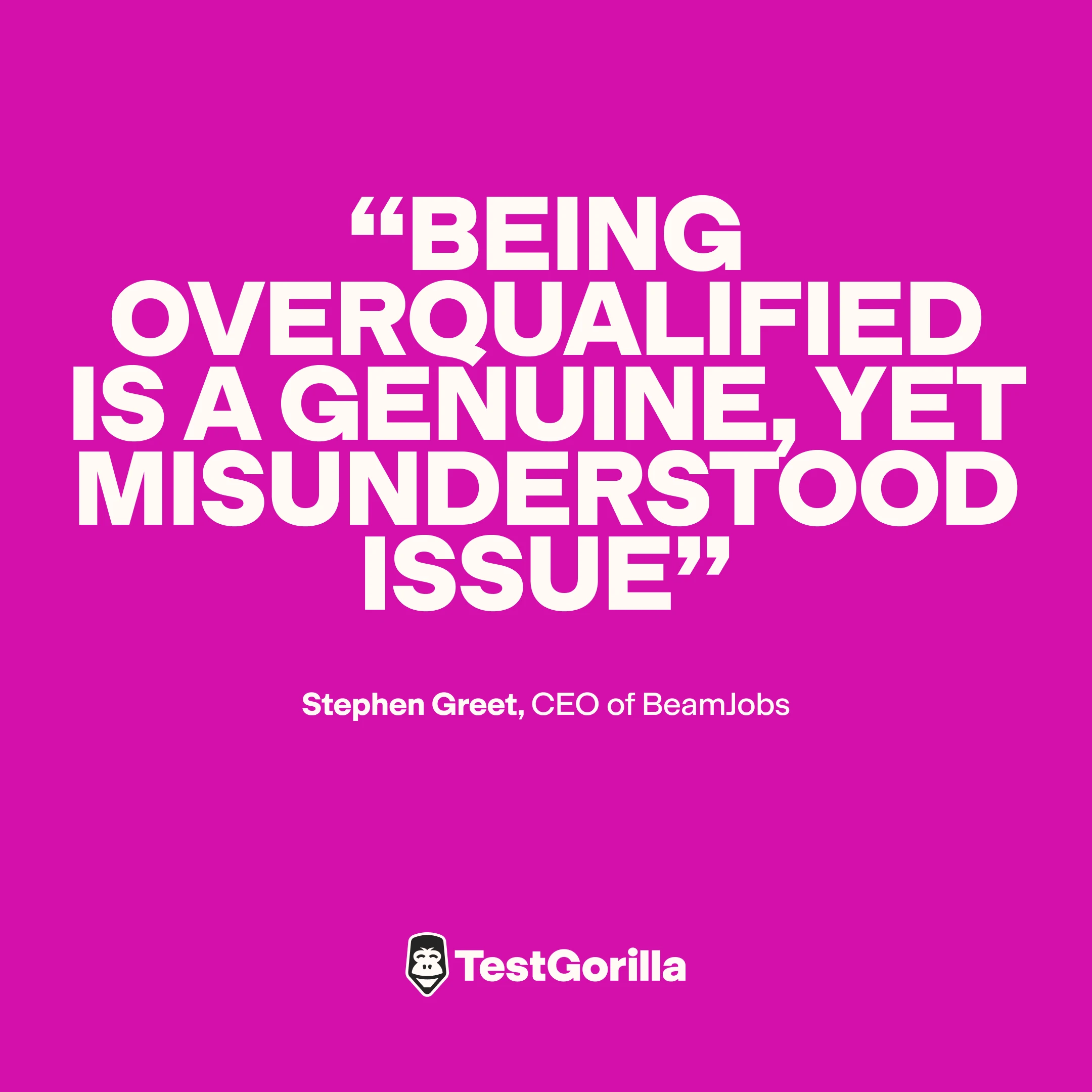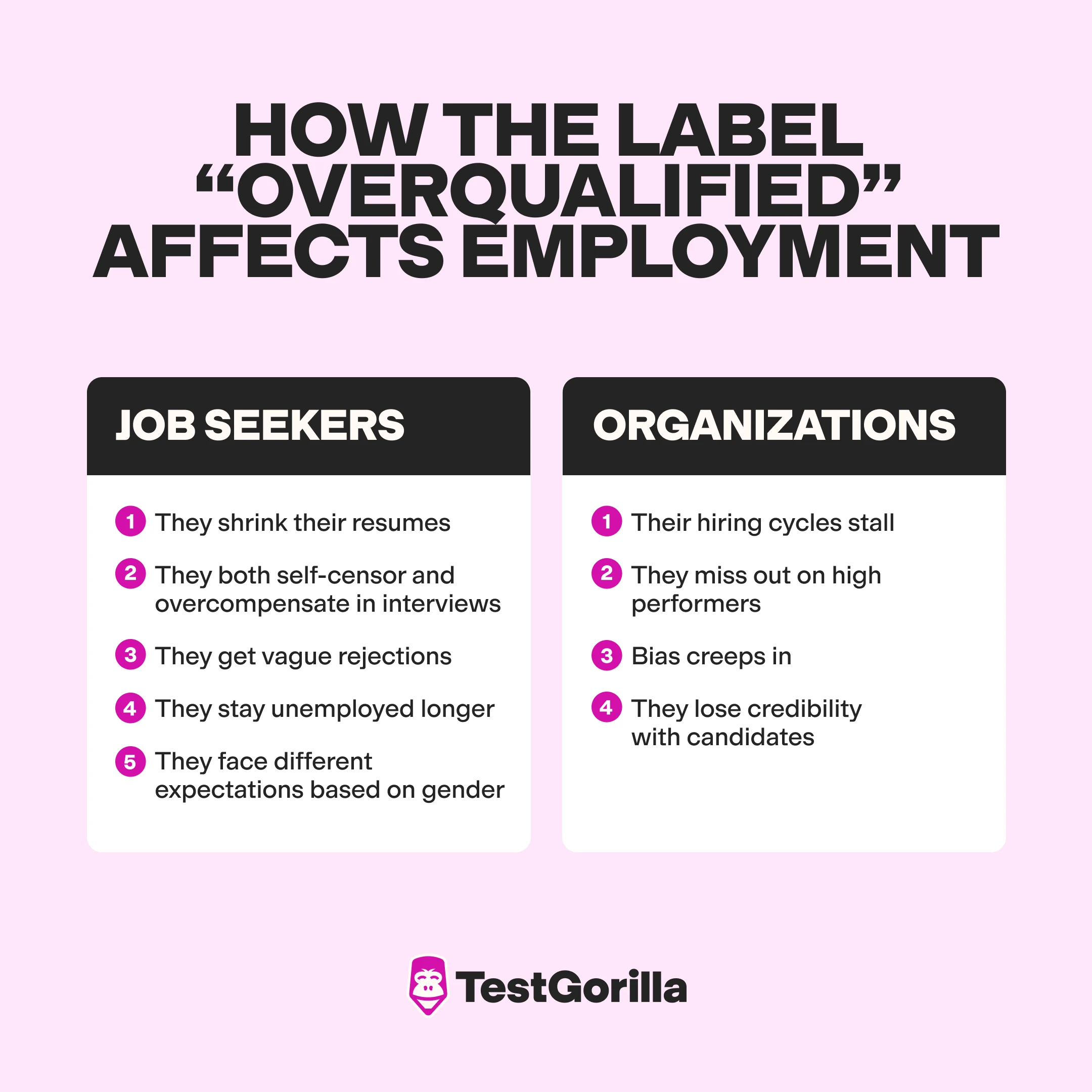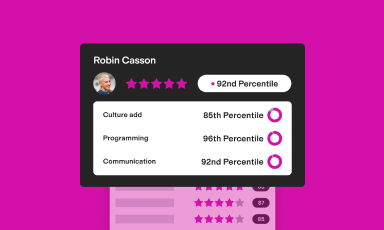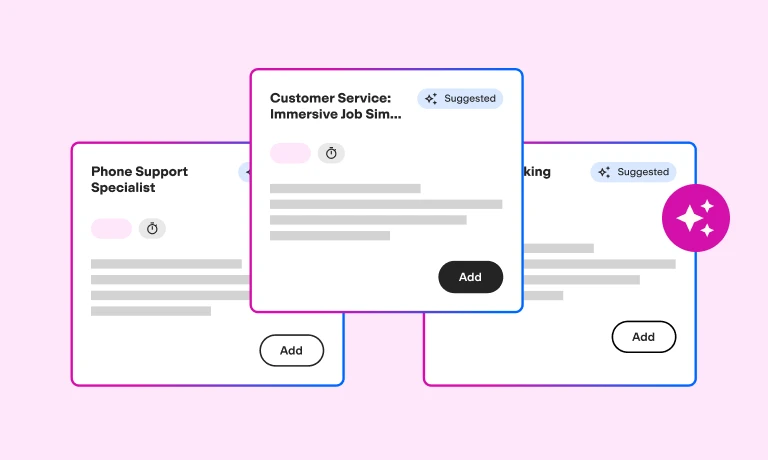The “overqualified” paradox: Unpacking what’s holding back your hiring
Companies claim they want experienced talent, yet they often reject candidates for being too experienced.
It’s a quiet contradiction, and it’s everywhere.
Behind the “overqualified” label are assumptions about salary, turnover, or fit – often without a real conversation. The result? Great people get overlooked, and critical roles stay open.
At TestGorilla, we’re here to unpack the overqualified paradox, show when the concern is real (and when it’s just bias), and explore how leading teams use skills-based hiring to make better, fairer hiring decisions – and stop turning away the talent they say they need
When “overqualified” is a real concern, and when it’s just bias
“Being overqualified is a genuine, yet misunderstood issue.” – Stephen Greet, CEO of BeamJobs
Most of the time, “overqualified” is shorthand – not anything of substance.
Yes, it usually means a candidate has more experience, education, or seniority than the role calls for. Maybe they’ve led teams, earned advanced degrees, or spent 20 years in the field, and now they’re applying for a hands-on or mid-level role.
But the label doesn’t explain why they want the job, how they’d approach the work, or what they’d bring. It just assumes something’s off.
Behind that assumption sits something else: concerns about salary, turnover, or team disruption. In some cases, “overqualified” serves as an unspoken stand-in for age bias or confirmation bias, quietly undermining efforts to build more inclusive, high-performing teams.
That doesn’t mean all concerns are never valid. As Stephen Greet, CEO of BeamJobs, tells TestGorilla:
“Overqualified candidates know their worth and can negotiate compensation exceeding a company's budget.” For lean teams, that can be tough.
It’s also fair to ask if someone who’s led teams or held executive roles will stay engaged in a mid-level position or leave when something bigger comes along.
But these risks aren’t guarantees. Many hiring teams default to the label without digging deeper, and miss out on great candidates as a result.
Dovile Gelcinskaite, Senior Talent Manager at Omnisend, points to the real issue: mindset, not skill level.
“It can be a mismatch if the role requires constant learning and adaptability,” she tells TestGorilla, “but the candidate’s past seniority makes them rigid in approach.”
In other words, it’s not about experience; it’s about alignment. Some candidates want a reset. Others are done managing. Many simply want meaningful, steady work without the pressure to climb.
So, before your HR manager passes on someone for being “overqualified,” ask:
What do they want from this role?
Have they clearly explained their motivation?
Are you assuming they’ll leave, or do you have reason to believe they’ll stay?
The answer might still be “no.” But it should never be “no” without a real conversation.
How the label can hurt candidates and organizations
Writing someone off as “overqualified” doesn’t just affect one candidate. It narrows your pipeline and overlooks people who’ve already had to fight harder to be seen in a crowded job market.
The toll on job seekers
They shrink their resumes. Many tone down titles, remove advanced degrees, leave off leadership experience, and cut down their qualifications. They do this in an attempt to appear “just right” – not too skilled or too far into their careers. (In fact, there’s an entire Reddit thread of individuals sharing their tactics to avoid looking overqualified.)
They both self-censor and overcompensate in interviews. Instead of highlighting their strengths, they downplay them. At the same time, candidates emphasize humility and stress their willingness to “roll up their sleeves” – even when they’ve led global teams. They also over-explain why they’re applying to avoid assumptions about ego, boredom, or misalignment.
They get vague rejections. After doing all that, many individuals receive the same outcome: “You’re not the right fit,” which offers no clarity, no opportunity for growth, and no real chance to address the employer’s concerns.
They stay unemployed longer. This isn’t because they lack ability, but because their perceived overqualification becomes a liability in the hiring process. That can lead to months of stalled searches, lower confidence, and pressure to settle for roles that don’t match the candidate’s skills or goals.
They face different expectations based on gender. Research from Carnegie Mellon shows that overqualification is judged differently for men and women. Overqualified men are penalized because their overqualification is perceived as a lack of long-term commitment, whereas overqualified women are seen as highly committed. The bar isn’t just higher – it’s uneven.
The toll on organizations
Their hiring cycles stall. When organizations automatically screen out “overqualified” candidates, roles stay open longer.
They miss out on high performers. A study in Personnel Review found that overqualified employees often put in more effort and contribute more to their teams when their roles offer room for growth. By screening them out, employers miss people who could boost team performance and morale.
Bias creeps in. As we’ve covered, the term “overqualified” is often a proxy for deeper, unspoken concerns, including cultural fit and team chemistry. But bias can creep in through these vague terms and push employers to make baseless rejections.
They lose credibility with candidates. Experienced professionals can often sense when they’re being dismissed or judged based on assumptions. When candidates are rejected as “overqualified” without real feedback, they don’t just walk away – they’re less likely to reapply or refer others to your company.
The best insights on HR and recruitment, delivered to your inbox.
Biweekly updates. No spam. Unsubscribe any time.
What great hiring teams do differently
Where average teams see risk in “overqualified” candidates, high-performing teams see potential. Here’s what they do differently:
They ask sharper questions in interviews
When candidates have more experience than the role requires, you need to get curious, not cautious. As Stephen Greet advises, “Recruiters can grow suspicious of why such candidates apply for lower-level roles… but the better move would be to ask them directly.”
Great hiring teams also ask behavioral interview questions like:
“What are you looking to do less of in your next role?”
“What does a healthy pace look like for you right now?”
“What kind of work still feels meaningful, even after all your experience?”
These questions invite clarity without judgment. They create space for experienced candidates to explain what they’re seeking – and why your role might be the right one.
They also help hiring managers move past fear-based assumptions and into real alignment. That’s especially important in a hiring climate where 63% of employers say it’s harder to find great talent now than it was a year ago.
They offer contract-to-hire options when there’s hesitation
Hiring someone with senior-level experience into a simpler role can feel risky. But it doesn’t have to be all or nothing.
As Jessica Glazer, Strategic Recruitment Director at MindHR, tells us:
“Another great way for people who are overqualified to get hired is to offer starting on contract. This way, it’s an open door on a two-way street: the company isn’t investing too much, and both the company and the candidate have an opportunity to test the waters to see if the placement will work – which often it does.”
So, if you're on the fence about a candidate who looks “too senior,” offer a 3–6-month contract or project-based trial. And if it doesn’t work out? No harm, no foul.
They replace assumptions with evidence
When hiring teams label someone as “overqualified,” they’re almost always reacting to uncertainty. Will the person want more than what the company can offer? Will they get bored and leave soon?
But these are questions of motivation, not skill. And great hiring teams don’t guess at motivation. They test for it.
Instead of starting with resumes, which is where bias and guesswork can creep in, top teams lead with structured talent assessments. They use role-specific skills tests to confirm key capabilities, then use motivation and personality tests to see how the candidate works, what drives them, and whether the role fits their goals.
Why does this matter? According to our State of Skills-Based Hiring 2025 report, 69% of employers who were dissatisfied with a recent hire said the problem was motivation, not skill. Yet most companies still screen resumes before they understand a candidate’s intent.
The best teams flip that approach. Instead of asking, “Why would a former VP want this job?”, they ask, “Do they have the strengths and motivation to do this work well right now?” This helps them move past assumptions about seniority, career stage, or credentials and helps build a more accurate picture of who’s likely to thrive in the role.
The takeaway is simple: Experienced candidates aren’t a risk when you understand what drives them, and skills-based hiring helps you achieve that.
Rethink “overqualified” with TestGorilla
Writing off candidates as “overqualified” often means missing out on people who could bring value from day one.
Skills-based hiring helps you look past job titles and dig into what really matters: ability, motivation, and fit. With TestGorilla, you can assess real skills, uncover intent, and confidently hire candidates who are ready to contribute, regardless of what’s on their resume.
Ready to stop screening out the talent you actually need? Sign up for a free TestGorilla account or book a demo to get started.
Related posts
You've scrolled this far
Why not try TestGorilla for free, and see what happens when you put skills first.




















